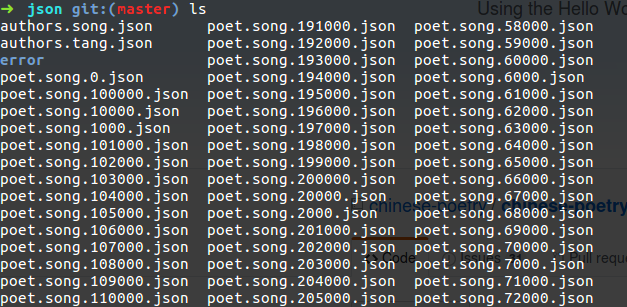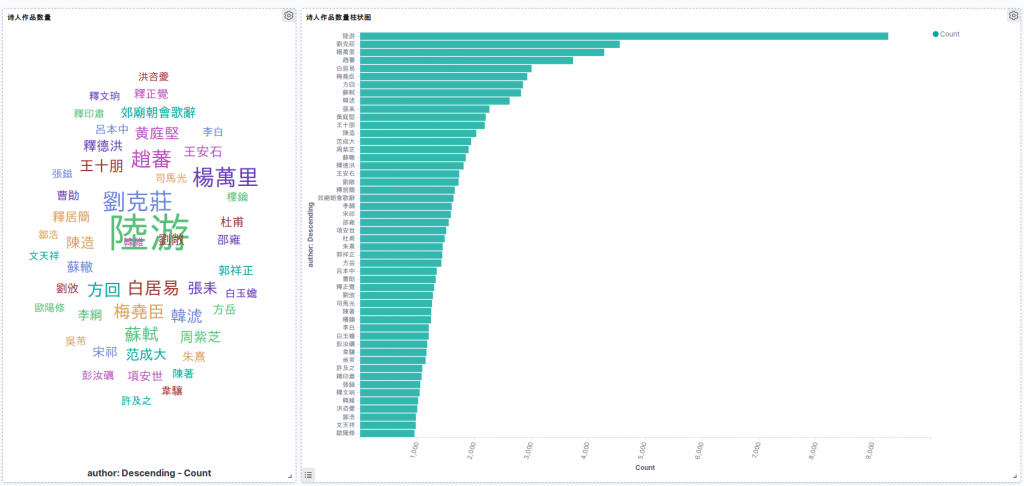导航
0 项目介绍
最近找到一个诗词数据库,想把它导入 ES 中,做一点分析。主要是为了熟悉 ES 的基本使用。
1 准备工作
- ES 和 Kibana 的环境搭建。可参考:Elasticsearch 与 Kibana 下载安装;
- JSON 数据准备。将此目录下的文件 clone 到本地;
- 假设你会 Java 和 SpringBoot。
2 创建索引模板
我打算把每个 JSON 文件里的数据,分别导入到一个单独的索引中。预先创建一个索引模板,生成新索引的时候,就不用重复设置了(根据业务需要,我们可能会针对不同的字段,配置不同的分词器)。
在 Kibana 中发送请求:
PUT _template/poem
{
"index_patterns": ["poem*"],
"settings": {
"number_of_shards": 1
},
"mappings": {
"properties": {
"author": {
"type": "keyword"
},
"paragraphs": {
"type": "text"
},
"title": {
"type": "text"
},
"id": {
"type": "text",
"index": false
},
"tags": {
"type": "keyword"
}
}
}
}
所有以 poem 开头的索引,都将使用这个模板。
3 编写 Java 代码
这里讲解一些重点的代码。完整项目点这里(//todo)。
3.1 导入依赖
build.gradle 导入依赖:
implementation ('org.elasticsearch.client:transport:7.4.2') {
exclude module: 'org.elasticsearch.plugin:transport-netty4-client:6.4.3'
}
implementation 'org.elasticsearch.plugin:transport-netty4-client:7.4.2'
implementation 'org.elasticsearch:elasticsearch:7.4.2'
3.2 编写 EsService 类
我们将通过 EsService 类来跟 ES 打交道,用到 ElasticSearch Client 的 Java API。主要做以下工作:
- 创建与 ES 的连接;
- 使用 bulk API 向 ES 批量插入 JSON 数据;
- 切断连接。
代码如下:
@Component
@Slf4j
public class EsService {
@Autowired
private EsConfig esConfig;
private TransportClient client;
@PostConstruct
public void init() throws UnknownHostException {
client = new PreBuiltTransportClient(Settings.EMPTY)
.addTransportAddress(new TransportAddress(InetAddress.getByName(esConfig.getHost()), esConfig.getPort()));
}
public void post(List<String> jsonList, String index, String type) {
BulkRequestBuilder bulkRequest = client.prepareBulk();
for (String json : jsonList) {
bulkRequest.add(client.prepareIndex(index, type)
.setSource(json, XContentType.JSON)
);
}
BulkResponse bulkResponse = bulkRequest.get();
if (bulkResponse.hasFailures()) {
log.error("has failures!");
throw new RuntimeException("failed");
} else {
log.info("complete");
}
}
public void close() {
client.close();
}
}
3.3 主逻辑类 PoemSender
PoemSender 类将包含导入数据到 ES 的整体逻辑,大致如下:
- 加载待处理的 json 文件名列表;
- 遍历该列表:根据文件名得到索引名,加载文件内容,切分成 JSON 字符串列表,发送到 ES。
代码如下:
@Component
@Slf4j
public class PoemSender {
private static final String POEM_TYPE = "_doc";
@Autowired
private PoemConfig poemConfig;
@Autowired
private EsService esService;
public void loadAndSend() throws IOException {
List<String> fileNames = poemConfig.getFileNames();
for (String fileName : fileNames) {
List<String> poems = loadJsonData(fileName);
String index = fileName2Index(fileName);
esService.post(poems, index, POEM_TYPE);
log.info(String.format("%s posted", index));
}
esService.close();
}
private String fileName2Index(String fileName) {
String res = fileName.replaceFirst("poet", "poem");
res = res.replace(".json", "");
res = res.replaceAll("\\.", "_");
return res;
}
private List<String> loadJsonData(String fileName) throws IOException {
GlobalTimer.getInstance().restart();
String content = FileUtils.readFile(poemConfig.getPoemHome(), fileName);
content = StringUtils.trimWhitespace(content);
content = StringUtils.trimLeadingCharacter(content, '[');
content = StringUtils.trimTrailingCharacter(content, ']');
String[] poems = content.split(",(?=\\s+\\{)");
int time = GlobalTimer.getInstance().getTimeInSeconds();
log.info("load time: " + time);
return Arrays.asList(poems);
}
}
4 运行验证
执行 Java 代码,会把全唐诗和全宋诗的所有内容导入到 ES 中。
在 Kibana 中发送如下请求:
GET poem*/_search
{
"query": {
"match_all": {}
}
}
结果如图:




